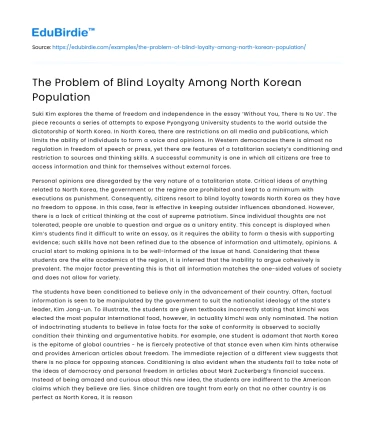Suki Kim explores the theme of freedom and independence in the essay ‘Without You, There Is No Us’. The piece recounts a series of attempts to expose Pyongyang University students to the world outside the dictatorship of North Korea. In North Korea, there are restrictions on all media and publications, which limits the ability of individuals to form a voice and opinions. In Western democracies there is almost no regulation in freedom of speech or press, yet there are features of a totalitarian society’s conditioning and restriction to sources and thinking skills. A successful community is one in which all citizens are free to access information and think for themselves without external forces.
Personal opinions are disregarded by the very nature of a totalitarian state. Critical ideas of anything related to North Korea, the government or the regime are prohibited and kept to a minimum with executions as punishment. Consequently, citizens resort to blind loyalty towards North Korea as they have no freedom to oppose. In this case, fear is effective in keeping outsider influences abandoned. However, there is a lack of critical thinking at the cost of supreme patriotism. Since individual thoughts are not tolerated, people are unable to question and argue as a unitary entity. This concept is displayed when Kim’s students find it difficult to write an essay, as it requires the ability to form a thesis with supporting evidence; such skills have not been refined due to the absence of information and ultimately, opinions. A crucial start to making opinions is to be well-informed of the issue at hand. Considering that these students are the elite academics of the region, it is inferred that the inability to argue cohesively is prevalent. The major factor preventing this is that all information matches the one-sided values of society and does not allow for variety.
Save your time!
We can take care of your essay
- Proper editing and formatting
- Free revision, title page, and bibliography
- Flexible prices and money-back guarantee
The students have been conditioned to believe only in the advancement of their country. Often, factual information is seen to be manipulated by the government to suit the nationalist ideology of the state’s leader, Kim Jong-un. To illustrate, the students are given textbooks incorrectly stating that kimchi was elected the most popular international food, however, in actuality kimchi was only nominated. The notion of indoctrinating students to believe in false facts for the sake of conformity is observed to socially condition their thinking and argumentative habits. For example, one student is adamant that North Korea is the epitome of global countries - he is fiercely protective of that stance even when Kim hints otherwise and provides American articles about freedom. The immediate rejection of a different view suggests that there is no place for opposing stances. Conditioning is also evident when the students fail to take note of the ideas of democracy and personal freedom in articles about Mark Zuckerberg’s financial success. Instead of being amazed and curious about this new idea, the students are indifferent to the American claims which they believe are lies. Since children are taught from early on that no other country is as perfect as North Korea, it is reasonable behavior for the students to follow their teachings and view the articles as fiction. Set expectations of social conventions prevent the students from growing their knowledge.
Access to reliable information sources is required for a society to have an intellectual outlook on situations. Kim’s essay assignment demonstrates the importance of having viable information and opinions. She is able to communicate to both her students and the readers of the essay the necessity of personal contentions in order for intellectual independence. The process of researching evidence and alternative viewpoints is largely impossible in North Korea because of the extensive restrictions to reading material. However, Western democracies also have their relative limitations to unbiased news. Major news sources are owned by private companies, like Fairfax Media, which infiltrate their own viewpoints in publications. Additionally, broadcasting networks can create subjectivity in their shows by selectively choosing information to relay their sponsor’s thoughts along with consciously omitting particular stories. This goes to show the extent that media is filtered in countries even with the freedom to press.
Overall, there is subjectivity present in news and information sources in both totalitarian and democratic states, with different degrees. It is difficult to achieve complete freedom to form opinions alone with social and political factors limiting the access to pure facts. However, it is important for a society to identify limitations and restrictions by external forces and seek to overcome prejudices by adopting the willingness to raise questions and answer them.






 Stuck on your essay?
Stuck on your essay?

